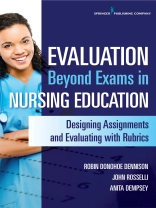Helps educators to design assignments and rigorous rubrics that truly measure student learning objectives
The ability of students to pass an examination does not necessarily reflect or guarantee their ability to apply knowledge in practice, nor are traditional exams a sufficient means to evaluate all learning objectives. Written for both new and seasoned nurse educators, this book is unique in its provision of rigorous rubrics that fully take into account learning objectives and the teachingñlearning process, and promote objective grading. It examines a variety of time-tested, alternative evaluation methods, discusses how to design them, and includes best practices for using them.
The book provides an overview of how evaluation and rubrics play an integral part within the larger nursing education teachingñlearning process. It helps educators clearly define learning objectives and desired outcomes, and how to evaluate them. The book describes how to formulate a variety of teaching strategies, design effective assignments, and examine in detail specific evaluation methods including best practices for their use and exemplar analytic scoring rubrics. Also available are detailed, modifiable grading rubric templates for each assignment presented. Evaluation methods covered include papers, presentations, participation, discussion boards, concept maps, case studies, reflective journals, and portfolios. The book will assist both new and seasoned nurse educators in their quest to graduate competent, safe nurses at all levels of nursing education.
Key Features:- Provides rigorous, modifiable rubrics for learning objective grading
- Includes time-tested alternative evaluation methods
- Describes best practices for designing a variety of teachingñlearning evaluation tools
- Includes guidelines for writing clear assignment descriptions
- Discusses papers, presentations, concept maps, case studies, portfolios, and more
Table of Content
‘
Preface
Part 1: Introduction to the Evaluation of Learning Outcomes using Assignments
1. Evaluation beyond Examinations
2. Determination of Student-Learning Objectives and Outcomes
3. Designing Effective Assignments for Evaluation
4. Development and Use of Scoring Rubrics for Objective Grading
5. Assessment, Evaluation, and Grading
Part 2: Best Practices in the Development of Effective Assignments and Analytic Scoring Rubrics
6. Papers
7. Presentations
8. Participation
9. Discussion Board
10. Reflective Journals
11. Case Studies
12. Concept Maps
13. Posters
14. Student Portfolios
‘About the author
John Rosselli, MS, RN, FNP-BC, CNE, is the Director (Interim) of the Nurse Educator Program and Instructor at Georgetown University, Washington, DC












